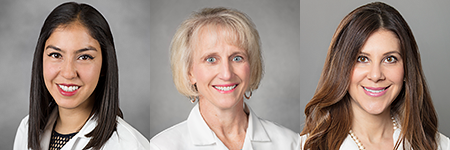|
Problems viewing this email? View in a browser
|
Long part of the LGBTQ community in San Diego’s Hillcrest neighborhood, UC San Diego Health has formalized and expanded efforts to improve gender inclusion to help reduce health disparities. Seemingly mundane changes, like bathroom signage and electronic medical records terminology, can put patients at ease and help clinicians ask the right questions — ultimately improving health care for this traditionally underserved, often invisible, community.
|
|
|
Riding his bike on a sunny day, 24-year-old John Lozick suffered a massive heart attack. Two emergency physicians happened to be nearby and immediately started CPR. Over the next hour, the physicians, paramedics, lifeguards and emergency room team at UC San Diego Health worked together to save Lozick’s life. Learn why Lozick was at risk and how his remarkable recovery has doctors calling it "one of the best cases of their careers."
|
|
For three months, Cynthia Zamora was temporarily speechless after surgeons removed a tumor that comprised more than half of her tongue. Head and neck cancer experts designed a comprehensive recovery plan that involved reconstructing the tongue using tissue from thigh skin and fat and rehab to teach Zamora how to talk, eat and walk again. Today, Zamora speaks slowly, with a raspy voice, but she is thankful to be heard and to once again enjoy some good fried chicken.
|
|
|
The debate over whether coffee is good or bad for you has been percolating for centuries, a drip-drip-drip of wild rumor and conflicting news. Herewith, six reasons why coffee may be good for you and six why maybe it’s not, complete with scientific studies. Sit back with a cup (of something), pull up a journal and enjoy.
|
|
Affordable ancestry DNA tests have unlocked access to individual genetic data but also uncovered confusing health information. Direct-to-consumer tests are not intended to diagnose or predict disease. Lisa Madlensky, PhD, UC San Diego Health genetic counselor, explains the difference between these and medical-grade genetic tests.
|
|
If Atkins, Zone, South Beach or Weight Watchers diets don’t do it for you, there’s the Tapeworm. Not really. Don’t do it, though folks have tried. The idea is to swallow a tapeworm egg, then let the parasite settle down inside your gut where it presumably takes care of all those extra calories. Problem is, once in, the worm is hard to get out. Things never go well.
|
|
|
Not every emergency requires racing to the hospital. UC San Diego Health’s two walk-in Express Care clinics, one in downtown San Diego and one in Encinitas, boast board-certified practitioners ready to diagnose and treat more than a dozen urgent conditions, from allergies and asthma to minor burns, sore throats and simple fractures, sprains and strains. You can even go online, see how many patients are in line and save a spot.
|
|
|
At 24, Sean Dobbs was diagnosed with dilated cardiomyopathy — a condition in which the heart becomes enlarged and cannot pump blood effectively. Eventually, the condition progressed to end-stage heart failure. Dobbs needed a heart transplant. UC San Diego Health cardiologist Eric David Adler, MD, implanted a left ventricular assist device, which allowed Sean to regain his health while he waited for a donor heart. Cardiothoracic surgeon Victor Pretorius, MBChB, led the transplant team.
|
|
If you’ve delivered by cesarean section and are pregnant again, you may be able to choose between a repeat C-section or attempting a vaginal delivery. Recently honored by the California Maternal Quality Care Collaborative for its efforts to promote vaginal births, UC San Diego Health has the resources and staff to offer vaginal birth after cesarean (VBAC) delivery to women whose health histories make them appropriate candidates. Find out if you qualify.
|
|
|
More than 1,000 medications are known to be potentially toxic to the liver, but one stands out because it’s abundantly found in your medicine cabinet. The drug is acetaminophen — the analgesic and fever reducer found in popular medications like Tylenol and NyQuil.
|
|
Your genome is like a recipe book with all the recipes that a cell needs to make the proteins it needs to build you. So how does each cell know which recipes to use and which to ignore? That’s where epigenomics provides helpful “post-it notes.” In this episode we talk to Dave Gorkin, associate director of the new Center for Epigenomics.
|
|

L-R: Carla Salcedo; Sharon Mick; Arisa Ortiz, MD
|
- How do I choose a healthy sweetener?
- Should I clean my ears?
- What is the best type of sunscreen?
|
|
How much protein should an active person be eating on a daily basis? That can depend on a few factors, including body composition, type of exercise and whether your goal is to lose weight or build muscle. Suzanne Smith, sports dietitian with UC San Diego Health, answers whether more protein is better (or just more) and weighs in on the keto craze.
|
|
|
You are receiving this email because you subscribed to our newsletter or you attended a UC San Diego Health event.
You may unsubscribe by using the links below.
|